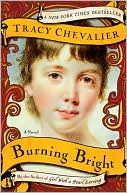
Burning Bright, Tracy Chevalier
Oh. So. Good.
I loved The Girl with the Pearl Earring, so I assumed this book would also capture my attention. Add to that my abject adoration of all stories based in 18-th century London (the more down-trodden or plague-y the better, my friends), and my love of poetry and there was really no other reasonable expectation to have other than that I would fall madly in love with the characters, the setting, the story, the whole nine yards.
And I did. But only after having completed it and having contemplated it for a bit did I really get it. The story is that of the Jem Kellaway, a country boy from Dorset whose family moves to London after a family tragedy. He and his younger sister, Maisie, befriend rough and tumble Maggie Butterfield, the typical, hardened street urchin-y smart mouth who is savvy in the ways of London's seedy underbelly. Together Jem and Maggie befriend the poet William Blake, who lives next door to the Kellaway's, and who seems to see Jem and Maggie as more than simply two kids running through the streets of London looking for mischief.
The tension between opposites, and more importantly, what lies between the poles, is the main motif here. Jem, the country boy to Maggie's city girl. One seemingly representing innocence, the other experience. But as the story unwinds we realize that isn't always the case and that people are, at once, a mixture of these two ideas, depending upon the circumstances in which they find themselves. The loss of innocence, and the multitude of forms that loss can take, plays out over and over again in the pages of the story, each time painfully reminding the reader that pure innocence is fleeting and impossible to replace.
However, this loss of innocence doesn't bring with it only dispair--there are glimmers of hope and happiness sprinkled amidst warehouse fires, mob scene riots and exhausting treks across the country-side.
Initially I was disappointed with the ending of the story--it seemed, well, anticlimactic to me. There was no screamingly big finish--no great tragedy or overwhelming joy. There is the sense, simply, that life will go on for these people. My first impulse was to feel let down. But after a time I realized that this is precisely the intention of the novel--life is not lived in the extreme, in the realm of opposites--it's lived within the space in between those poles, balancing between innocence and experience.
I'm going to miss these characters, but given the conclusion Chevalier created for them, I will probably spend some idle time imaging with the future could possibly have held for them. And I've always thought that's the mark of a good piece of literature.




No comments:
Post a Comment